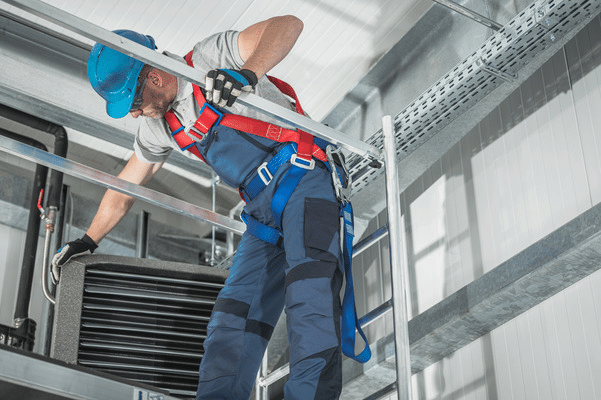Stories you may like
HVAC Technician
HVAC systems are the lifeblood of any indoor setting, whether you talk about homes, grocery stores, malls, offices, manufacturing facilities, airports, or hotels. Every commercial and residential property requires a solid HVAC system to ensure excellent air quality and effective heating and cooling.
Now, let’s address the question at hand: What is an HVAC Technician? The skilled individuals operating in this field are known as HVAC technicians or HVAC techs. In certain instances, these professionals are also responsible for installing and maintaining refrigeration units, earning them the title of HVACR or HVAC/R technicians.
What Do HVAC Technicians Do?
The role of an HVAC technician encompasses a diverse range of responsibilities. These professionals are primarily tasked with installing, repairing, and maintaining heating, ventilation, air conditioning, and refrigeration systems.
HVAC technicians are skilled in inspecting and diagnosing equipment, troubleshooting issues, performing repairs or replacements of faulty components, and ensuring the overall functionality and efficiency of HVAC systems.
Additionally, they may be involved in routine maintenance, system tests, calibrating controls, and advising clients on energy-efficient practices. With their expertise, HVAC technicians are crucial in creating and maintaining comfortable and well-regulated indoor environments.
Installation
HVAC technicians install various HVAC equipment and commercial refrigeration systems, including furnaces, heating and air conditioning systems, heat pumps, ventilation systems, and refrigeration units. They follow blueprints, specifications, and manufacturer instructions to ensure proper installation.
Repairs and Maintenance
HVAC technicians diagnose, troubleshoot, and repair malfunctions or issues in HVAC systems. They conduct inspections, identify faulty components, and perform necessary repairs or replacements to restore optimal functionality. Regular maintenance tasks such as cleaning coils, lubricating parts, and inspecting electrical connections are also part of their responsibilities.
System Testing and Performance Evaluation
HVAC technicians perform tests and measurements to assess the performance of HVAC systems. They use specialized tools to check airflow, temperature, pressure, and refrigerant levels. Based on the results, they make adjustments or recommendations to improve efficiency and performance.
Customer Service
HVAC technicians interact with clients, providing guidance and answering questions about HVAC systems. They may advise on energy-efficient practices, recommend suitable equipment upgrades, and explain maintenance procedures to ensure longevity and optimal performance.
Safety and Compliance
HVAC technicians adhere to safety guidelines and industry regulations to ensure their own safety as well as the safety of clients and the environment. They handle refrigerants responsibly, follow electrical codes, and maintain a clean and organized work environment.
Documentation and Reporting
HVAC technicians maintain work records, including service reports, maintenance logs, and equipment inventory. Accurate documentation helps track repairs, identify recurring issues, and facilitate future maintenance or upgrades.
Working Conditions of an HVAC Technician
HVAC technicians work in various environments, such as residential, commercial, and industrial settings. An HVAC technician’s job can be physically demanding, requiring lifting, climbing, and working in tight spaces. They may be exposed to different weather conditions while working outdoors.
Safety precautions and protective gear are necessary due to potential occupational safety hazards from electrical systems and refrigerants. Travel to job sites is often required, and work schedules may include evenings, weekends, and on-call shifts. HVAC technicians may work independently or as part of a team, interacting with clients and collaborating with other professionals.
How to Become an HVAC Technician?
Many modern buildings, including commercial and residential ones, have climate control systems that typically require maintenance. A heating, ventilation, and air conditioning (HVAC) technician ensures these systems function to help maintain suitable temperature and humidity levels in buildings. Learning the skills and theoretical knowledge to develop if you want to pursue an HVAC career can help you make informed career decisions.In this article, we discuss how to become an HVAC technician, outline the benefits of pursuing this career, and explain the skills these professionals use in their work.Key takeaways:
- Aspiring HVAC technicians should earn a secondary school diploma, complete a pre-apprenticeship training program, and attain relevant trade certifications.
- HVAC technicians enjoy job security, mobile work, good earning potential and rewards for job challenges.
- HVAC technician skills comprise effective communication, troubleshooting, time management, mechanical aptitude, attention to detail, and knowledge of power and hand tools.
Knowing how to become an HVAC technician can help you understand the actionable steps you may take to start working in this profession. An HVAC technician ensures HVAC systems can maintain temperature and air quality in both public and private buildings to provide comfortable living conditions. They install, maintain, and fix HVAC systems. Here are some steps you can follow to pursue this career:
1. Earn a secondary school diploma
The minimum requirement to work as an HVAC technician is typically a secondary school diploma. You may also attend a vocational institution while in secondary school to help you gain basic, relevant knowledge to succeed in the role. Consider taking courses that teach you mechanical skills and valuable information about HVAC systems.
2. Complete an HVAC pre-apprenticeship training program
Employers typically prefer hiring apprentices with a basic knowledge of HVAC systems. You can gain this knowledge by enrolling in an institution that offers pre-apprenticeship programs. These programs typically last between 18 weeks and 12 months and consist of practical and theoretical lessons that help prepare you for the HVAC trade. A pre-apprenticeship program may make it easier to secure a paid apprenticeship. Several pre-apprenticeship programs also prepare you for the exams you may take to earn various certifications. The courses you may take during your pre-apprenticeship include:
- Air conditioning, heat pumps, and controls
- Refrigeration tools and materials
- Heating and humidification systems
- Safe handling of natural gas
- Troubleshooting and servicing
- Pressure regulators, gas meters, and relief valves
3. Earn relevant trade certifications
As HVAC is a regulated industry, there are HVAC certifications employers require you to possess before you can work as an apprentice. The certifications to earn typically depend on the employer. For example, HVAC technicians in Ontario typically work on propane-fired and gas-fired equipment. Employers require candidates to have a gas technician certification to prove they can work with the necessary equipment. You can do some research to discover the certifications to pursue in your province. These certifications typically focus on how to manage and handle various complex materials and pieces of equipment.
4. Complete an apprenticeship
You're more likely to secure an apprenticeship if you've completed a pre-apprenticeship program, as employers may perceive that you have more professional knowledge. To succeed in an HVAC apprenticeship program, you complete a certain number of hours of theoretical and practical training before passing the final certification exam. After meeting these requirements, you can apply to become certified and register as an HVAC technician. It usually takes three to five years to complete an apprenticeship program.
5. Advance your career
After completing your apprenticeship, you can specialize in one field, such as air conditioning or refrigeration, or work as a generalist. Starting in the HVAC field, you may begin your career as an installer before advancing to work as a service and maintenance HVAC technician. After gaining some years of experience, you may start your own contracting business.
Benefits of pursuing a career in HVAC
Here's a list of benefits you may enjoy if you pursue a career as an HVAC technician:
Job security
Working as an HVAC technician typically offers job security, as there's always a demand for these professionals. People always require temperature and humidity control in their homes and commercial buildings to manage varying weather conditions. The Job Bank forecasts that HVAC professionals are likely to have good job prospects over the next three years in several provinces. Major cities with large populations and high building densities may provide regular work for HVAC technicians.
Mobile work
As an HVAC technician typically visits various locations to provide their services, you may travel from one site to another. Instead of working from an office, you may be mobile and have your equipment and necessary materials in a van, ready to work wherever a customer asks you to. These changes of scene and the chance to see different HVAC systems in different places may be rewarding and stimulating. If you enjoy interacting with people and working with others, you may enjoy having the opportunity to meet new people.
Life safety
In addition to keeping people comfortable, maintaining an HVAC system in homes and workplaces typically keeps people safe. The ventilation system of a building is important, as it ensures everyone within the premises can breathe fresh, clean air. It keeps the atmosphere free of smells, removes excess moisture, and reduces bacteria, resulting in a healthier environment. These systems are especially important for creating sterile spaces, as in hospitals. They also help to maintain healthy living conditions in places where people spend many hours, such as schools, office buildings, and homes.
Good potential earnings
Working in the HVAC profession gives you good earning potential, as there are various opportunities for advancement. Entry-level positions, such as apprenticeships, offer a competitive rate. While working, you may have a long-term goal, such as owning a contracting business. This can potentially provide high earning power and allow for flexibility.
Opportunities for rewarding challenges
Working as an HVAC technician allows you to apply your troubleshooting and creative thinking skills. As solutions to problems may not be straightforward, you can combine your technical knowledge and creativity to implement effective solutions. If you enjoy stimulating tasks, the HVAC field allows you to apply your skills as you approach every new challenge with an open mind. For example, installing an HVAC system requires you to identify a suitable strategy to get power into the unit.











User's Comments
No comments there.